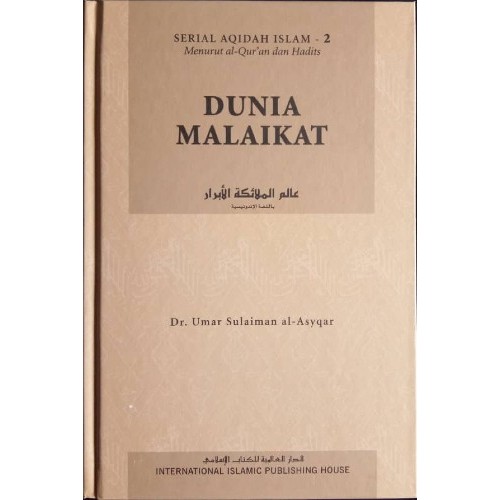| Weight | 0.50 kg |
|---|---|
| Author | |
| Binding | Paperback |
| ISBN | 9789791807104 |
| Made in | Indonesia |
| Pages | 64 |
| Publisher | Gema Insani |
Sifat Shalat Nabi SAW
RM6.00
Related Products
Fatawa-fatawa Tentang Wanita (H/B)
Buku ini merupakan kumpulan fatwa-fatwa pilihan yang berkaitan dengan masalah wanita, yang dihimpun dari fatwa-fatwa Syaikh Abdul Aziz bin Baz, Syaikh Muhammad al-Utsaimin, Syaikh Abdullah al-Jabrain, dan fatwa-fatwa Lajnah Da’imah lil-Ifta’. Buku ini penting dimiliki setiap muslimah, karena di dalam buku ini terdapat jawaban-jawaban atas persoalan-persoalan yang dihadapi atau dialami oleh wanita muslimah dalam kehidupannya, di mana banyak dari persoalan-persoalan tersebut yang tidak didapatkan jawabannya dalam buku-buku klasik.
This is the Indonesian translation of Fatawa: Rulings for Muslim Woman. Acquiring knowledge of Islam is incumbent upon every Muslim – male and female – in order to live one’s life according to the commands and recommendations of the Qur’an and the Sunnah of Allah’s Messenger (blessings and peace of Allah be upon him). Naturally, women have some specific issues that concern them and that are different than those that concern all Muslims or only men. In this book, these rulings, or fatâwa, have been compiled from the religious verdicts of well-known and respected Islamic scholars, both past and present — Shaykh ‘Abdul-‘Aziz ibn Baz, Shaykh Muhammad ibn ‘Uthaymeen, Shaykh Ibn Jibreen, and the Standing Committee for Scholarly Research and Issuing Fatwas (Saudi Arabia). The rulings are derived from the Qur’an and the Sunnah. The rulings were compiled in this book by Muhammad al-Musnid and translated into Indonesian/Malay by Uril Bahruddin. This book is a compendium of such rulings in a question-and-answer format, catering to the special needs of the Muslim woman. It is a concise and readily accessible reference, and an invaluable addition to the Muslim woman’s personal library.
Ta’limul Muta’allim (Pentingnya Adab Sebelum Ilmu)
Saya melihat banyak penuntut ilmu pada zaman kita bersungguh-sungguh, tetapi tidak sampai kepada ilmu. Tidak mendapat manfaat dari ilmunya. Mereka terhalang dari buah ilmu (yaitu mengamalkan dan menyebarkannya) karena keliru dalam menempuh jalan (untuk mencari ilmu) dan meninggalkan syarat-syaratnya. Padahal siapa yang salah jalan maka akan tersesat, dan tidak akan meraih tujuan, baik sedikit maupun banyak. Maka saya ingin menjelaskan kepada mereka cara menuntut ilmu berdasar yang telah saya pahami dari buku-buku dan yang saya dengar dari guru-guru saya yang memiliki ilmu dan hikmah.
~ Imam Az-Zarnuji, Penulis Kitab Ta’limul Muta’allim
Dunia Jin Dan Setan – Serial Aqidah Islam – 3
Dunia Jin dan Setan: menurut al-Qurán dan hadits – Serial Aqidah Islam 3/ Dr. Umar Sulaiman al-Asyqar. Membaca buku ini kita akan dihantarkan kepada suatu pemahaman jernih yang bersumber dari Sang Pencipta tentang dunia jin dan setan sesuai dengan pemahaman salafussalih yang terpercaya. Bukan hanya itu, sang pengarang pun secara argumentatif mampu memberikan penjelasan setiap masalah dengan pendekatan yang bersifat nalar. Sehingga kita bukan hanya diajak mengimani seluk beluk jin dan setan berdasarkan teks-teks wahyu yang ada, tetapi kita juga diajak untuk memahaminya sesuai kemampuan nalar yang kita miliki. Maka buku ini sangat layak dijadikan sebagai salah satu referensi muslim yang ingin mengetahui dunia jin dan setan dari sumber yang shahih, sekaligus sebagai sarana untuk membentengi akidah dari berbagai keyakinan sesat dalam masalah ini.
This is the Indonesian translation of The World of the Jinn and Devils: In the Light of the Qur’an and Sunnah (Islamic Creed Series Vol. 3). Some people think that the issue of jinn, demons, and devils is one that should remain on the periphery of knowledge. They believe in going over this topic in the quickest of fashions and not giving it too much thought. They think that the benefits of such a study are very limited, and that being ignorant of this topic is not harmful at all. They say ‘seeing is believing’, but how often do we remind ourselves that what we can’t see still exists? Among Muslims, the important tenet of belief in jinn and devils is often forgotten. However, this is not an irrelevant matter. Humans today spend billions of dollars, with which they could develop countries and end poverty in the farthest reaches of the world, on research to discover whether there is any possibility of life on nearby planets. Scientists spend a great deal of their time and resources on this question. What about living beings that are known to exist right here with us on our earth? They live in our houses and they eat and drink with us. In fact, they affect our thoughts and our hearts and even drive us to destroy our own selves and to spill each other’s blood. No price can be put on the importance of the texts of the Qur’an and authentic hadiths that have reached us, giving us knowledge of this matter. Dr. ‘Umar al-Ashqar shows us how those texts uncover for us the secrets of these fellow-creatures: the world of the jinn. Adequate knowledge about their existence can help in our constant struggle to resist their influence. It will also help us in reaching the ultimate goal of creating the everlasting bond and closeness to Allah, the Beneficent, that we all seek.
Kepribadian Wanita Muslimah (IIPH)
Kepribadian Wanita Muslimah: menurut al-qur’an danas-sunnah. Wanita mempunyai peran yang sangat penting dalam keluarga, masyarakat dan negara, baik buruknya suatu bangsa sangat erat kaitannya dengan baik buruknya wanita. Wanita muslimah berbeda dengan wanita-wanita lainnya, ia mempunyai kepribadian yang ideal dan karakter yang istimewa, karena islam telah memberikan petunjuk dan ajaran bagaiman semestinya wanita muslimah dalam kehidupan ini, ia harus bisa memainkan perannya agar ia menjadi orang yang berguna bagi dirinya, keluarga, masyarakat dan bangsanya. Dalam buku ini, penulis menjelaskan bagaimana seharusnya wanita muslimah terhadap tuhannya, terhadap dirinya, kedua orang tuanya, suaminya, anak-anaknya, saudaranya, teman-temannya, tetangganya, dan masyarakatnya, sebagaimana yang diajarkan dalam Al Qur’an dan Hadits-hadits nabi. Ini semua beliau kaji dengan luas dan mendalam, lalu dituangkan dalam bahasa yang mudah, lugas dan jelas. Oleh karena itu buku ini pantas dimiliki dan dibaca oleh setiap wanita muslimah yang ingin menjadi sosok wanita muslimah sejati.
Rasul dan Risalah ; Serial Aqidah Islam – 4
Rasul Dan Risalah: menurut al-Qurán dan hadits – Serial Aqidah Islam 4/ Dr. Umar Sulaiman al-Asyqar. Di era kemajuan ilmu pengetahuan sekarang ini, banyak orang yang mengandalkan ilmu dan kemampuannya bahkan sampai menuhankan akal fikirannya. Mereka merasa tidak perlu lagi kepada ajaran dan petunjuk para nabi dan rasul, bahkan ada yang mengatakan bahawa rasul pun perlu dikritisi. Benarkah demikian? Mungkinkah manusia sampai kepada kebenaran hakiki dengan kemampuan akalnya. Jawabnya tentu tidak, sepandai apapun akal manusia tetap terbatas, ia tidak bisa mencapai kebenaran hakik kecuali dengan tuntunan wahyu yang dibawa oleh para rasul, ia tidak bisa mengetahui kebaikan dan keburukan secara benar dan mendetail tanpa petunjuk para rasul. Oleh karena itu, orang yang hanya mengandalkan akalnya saja tanpa memperdulikan petunjuk yang dibawa oleh para rasul akan tersesat jalan. Buku ini mengupas tuntas tentang nabi dan rasul serta ajaran mereka dengan rinci dan mendetail, baik yang berkaitan dengan definisi nabi dan rasul, perbedaan antara keduanya, urgensi diutusnya mereka, jumlah mereka, sifat-sifat dan tugas-tugas mereka. Oleh karena itu, buku ini pantas dimilikioleh setiap muslim yang ingin mengenal para rasul dan mengetahui ajaran mereka, dan juga siapa saja yang ingin mencari kebenaran.
Recently Viewed
[QQ] Handwriting Quran مصحف التدوين
مصحف التدوين الفاخر – بيدي رسمت حروفه وكتبت كلماته – حجم كبير
The blank Mushaf for writing is a type of Qur’an used to assist memorizers, teachers, and those interested in memorizing the Holy Qur’an or teaching their children. This Qur’an is characterized by containing the empty lines of the verses so that the lines appear empty from the inside with the outer borders of the lines visible. This makes it easier for the reader to write the verses from memory without referring to the Qur’an, thus enhancing memorization and review.
A Critique Of The Ruling Of Al-Taqlid (Dar ar Arqam)
Abu Dāwūd stated that Aḥmad said to him, “Do not make taqlīd of me, nor Mālik, al-Shāfiʿī, al-Awzāʿī or al-Thawrī; rather take from where they took.” [Masāʾil al-Imām Aḥmad (pp.276-277).
Nawāb Ṣiddīq Ḥasan Khan relays, “He was the judge of the congregation, the shaykh of al-Islam, the muhaqqiq, the ʿallāmah, the imām, the sulṭān of the ʿulamā, the imām of the world, the seal of the ḥuffāẓ (i.e. major ḥadīth scholars) without dispute, the proof for debaters, the supreme in isnād and the foremost within the domain of al-ijtihād. […] He did not see one similar to himself, and those who saw him did not see his likeness in knowledge and piety, and in standing for the truth with strength of character and preciseness of tongue. […] He gained proficiency within all the rational and textual sciences. This was to the point that he reached the apex of human understanding, his power of examination was acceded to by both friend and foe, his excellence in the sciences of ijtihād was acknowledged, and [he became] the one to clarify the matters of subtlety within the religion. […] From his works is Nayl al-Awṭār Sharḥ Muntaqā al-Akhbār of Ibn Taymiyyah, in four volumes. The eye of time has not been adorned with its likeness in examination, nor has the entirety of time granted its similitude in attention to the smallest of detail.” [Summarised extracts from his biography in al-Tāj al-Mukallal (443-449)]
The author states, “One of the researching scholars amongst the people of knowledge requested me to compile a treatise for him that would contain affirmation of the truth regarding al-taqlīd, as to whether it is permissible or not, in a manner that no doubt would be left after it nor objection to it would be accepted. Since the questioner is one of the eminent scholars, the response will be in the manner of ilm al-munāẓarah (the science of dialectics).”































